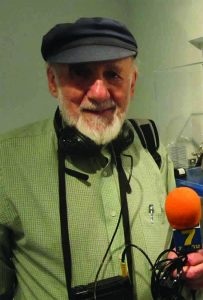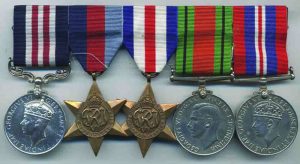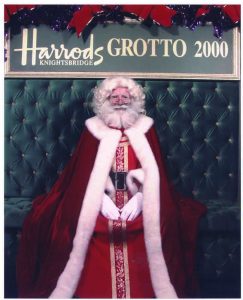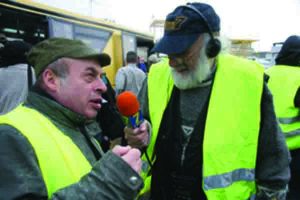
by: Ilse Posselt, Correspondent, BFP News Room
 Walter Bingham’s Jerusalem flat is filled with the physical memories of an extraordinary life. The souvenirs offer glimpses of the events, people and places that have formed his 92 years: faded photographs of long-lost family and friends, brittle telegrams signed by generals whose names resound in modern history, yellowed newspaper clippings proclaiming landmark events of times gone by and bits of metal hanging from colored cloth that testify to the recipient’s bravery in battle.
Walter Bingham’s Jerusalem flat is filled with the physical memories of an extraordinary life. The souvenirs offer glimpses of the events, people and places that have formed his 92 years: faded photographs of long-lost family and friends, brittle telegrams signed by generals whose names resound in modern history, yellowed newspaper clippings proclaiming landmark events of times gone by and bits of metal hanging from colored cloth that testify to the recipient’s bravery in battle.
“It is a good thing you kept proof,” I told Walter once, only half joking. “You have experienced so much that without the physical evidence, it would be easy to chalk up your stories to an overactive imagination.”
Walter waved his hand dismissively, but his eyes crinkled in pleasure. Surely he knew that the tale of his life resembled the plot of a blockbuster movie—just as I knew that the seemingly unassuming man I had met by chance in a Jerusalem convenience store and who had become my Jewish saba (granddad) is one of a kind.
Walter was born Wolfgang Billig in 1924 in Germany. The son of Jewish parents who emigrated from Poland, his childhood was uneventful. Things changed in 1933 when Hitler came into power. Soon his days were filled with racial education, classmates dressed in Hitler youth uniforms chanting Jew-hatred and finally, the sound of shattering glass as Jewish property and synagogues were smashed during Kristallnacht in 1938.
Within days, some 30,000 Jewish men disappeared into the gaping mouths of concentration camps. Walter’s father was deported to Poland where he later died in the Warsaw Ghetto. The life of every Jew was in imminent danger. Then, days before World War II erupted, Walter was selected for the Kindertransport (Children’s Transport), a rescue effort snatching Jewish children out of Nazi Germany to safety in Britain.
“Our mothers and fathers were the heroes,” he remembers. “We expected our parents to follow. But the grownups knew they might never see their children again. Most were right. Yet as the train pulled away, none of them cried. They were strong for us. They did not want weeping to be the last memory we had of them.”
Walter was one of the few lucky ones. His mother survived the camps and after the war, the two reunited. “That was the best moment of my life,” he smiles.
Leaving Germany, Walter wanted to settle in the Promised Land, but the rules of the British Mandate made entry impossible. The Kindertransport took him to England where he eventually joined the British army. “Soldiers enlist because they are called up or want to fight for their country,” he muses. “But my motivation was different. I had no country. I joined to fight the Nazis and free my family.”
 As an ambulance driver, Walter saw action during the Normandy invasion in 1944 and was awarded the Military Medal for “Bravery in the Field” for ferrying wounded soldiers through some of the most harrowing battles. “It was not bravery,” he shrugs, “it had to be done and I was there.”
As an ambulance driver, Walter saw action during the Normandy invasion in 1944 and was awarded the Military Medal for “Bravery in the Field” for ferrying wounded soldiers through some of the most harrowing battles. “It was not bravery,” he shrugs, “it had to be done and I was there.”
Given his fluency in German, Walter was transferred to Counter Intelligence during the last days of war and was sent to Hamburg as a document specialist to sift through Nazi papers. Here he came face-to-face with former Nazi foreign minister, Joachim von Ribbentrop. “He was dashing and arrogant. When I asked him about the Jews, he told me he knew nothing; it had all been Hitler’s doing. Just imagine—the foreign minister claiming innocence of the murder of millions committed under his watch.”
 After the war, Walter felt the familiar stirrings to return to his ancient homeland. Yet somehow things never fell into place. He returned to England where he married a Holocaust survivor and started a family. Walter earned a degree in politics and philosophy and later a postgraduate in political philosophy. Then came an illustrious career in journalism, radio, acting and modeling.
After the war, Walter felt the familiar stirrings to return to his ancient homeland. Yet somehow things never fell into place. He returned to England where he married a Holocaust survivor and started a family. Walter earned a degree in politics and philosophy and later a postgraduate in political philosophy. Then came an illustrious career in journalism, radio, acting and modeling.
Walter became somewhat of a household name, his voice filling homes via sound waves and his face with its bushy beard featured in advertisements everywhere from magazines to London buses. It was the signature beard, he smiles, which made him a favorite Santa Claus in London’s Harrods and landed him a role in two Harry Potter movies.
Yet England was never truly home and the longing for Israel kept tugging at his heart. One of Walter’s fondest memories is piloting a single-engine airplane from England to Israel. The highlight was lingering mid-air in the skies above Jerusalem. “I circled the city that has been in my prayers every day of my life, overcome with emotion. I saw the beauty laid out from horizon to horizon. The sun tipped the Judean hills, bathing the city in shimmering gold. It was Jerusalem of gold. I was undone.”

Walter interviewing Natan Sharansky
In 2004, 80-year-old Walter came home to the Promised Land, making aliyah (immigrating to Israel) and settling in Jerusalem. The past 12 years have been busy. As the oldest field journalist in the Jewish state, Walter travels the country in search of stories to delight and educate listeners of his weekly radio show on Israel National Radio called Walter’s World. He is also a sought-after public speaker teaching audiences worldwide about the Holocaust.
Walter ends each program with the signature phrase. “Remember to visit your elderly neighbor.” He would, however, never group himself in that category. “On a good day I feel 40; on a bad day 50,” he chuckles.
Walter does not consider his life extraordinary. “I am no hero. I did what I had to do the best I knew how.” Looking back, he concedes, that he lived to the full. Yet looking ahead is more important. There are, after all, still many good things to come in the years ahead.
Photo Credit: Photos courtesy of Walter Bingham
All logos and trademarks in this site are property of their respective owner. All other materials are property of Bridges for Peace. Copyright © 2025.
Website Site Design by J-Town Internet Services Ltd. - Based in Jerusalem and Serving the World.